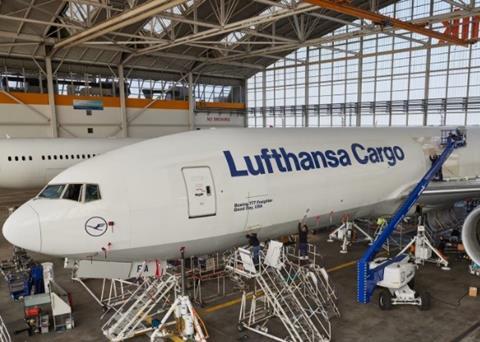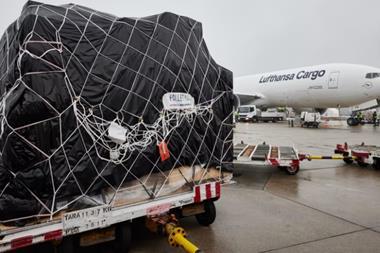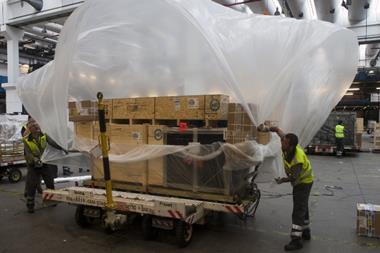
Lufthansa Cargo's first Boeing B777 freighter modified with a surface technology that helps save fuel and reduce emissions has taken flight.
The carrier will begin equipping all its B777Fs with the technology starting from this year.
Developed by Lufthansa Technik and German chemical company BASF, AeroSHARK is a surface film that mimics the microscopic structure of shark skin.
Its structure consists of ribs around 50 micrometers in size - so-called riblets.
If the flow pattern on the fuselage and engine nacelles of the Boeing 777F is optimised in this way, significant savings in fuel and thus emissions can be achieved, said Lufthansa Cargo.
For the modified B777F, Lufthansa Technik expects fuel savings of slightly more than 1%.
Extrapolated to Lufthansa Cargo's entire 777 fleet, this will result in annual savings of more than 4,000 metric tons of kerosene and nearly 13,000 metric tons of CO2 emissions, equivalent to about 53 individual cargo flights from Frankfurt to Shanghai.
The technology will now gradually be used on Lufthansa Cargo's entire fleet of B777Fs, making them more fuel-efficient and reducing emissions.
Lufthansa Cargo's first AeroSHARK-modified B777F , registered D-ALFA, took off for the first time on February 3. Under flight number LH8410, the B777F started from Frankfurt to Bengaluru, from where it will fly on to Chengdu.
"We are proud to be able to operate our entire freighter fleet even more efficiently in the future thanks to Sharkskin technology and to further reduce the carbon footprint of our modern fleet.
"Our investments for the introduction of AeroSHARK bring us closer to our goal of being 100% CO2-neutral in the air by 2050; on the ground, we would like to achieve this goal as early as 2030,” explained Dorothea von Boxberg, chairwoman of the executive board and chief executive of Lufthansa Cargo.
In cooperation with BASF, Lufthansa Technik is responsible for the specification of the material, the airworthiness certification and the implementation of the aircraft modifications, which are carried out during regular maintenance layovers.
In December of last year, the company obtained a Supplemental Type Certificate (STC) for two types of B777 from the European Aviation Safety Agency (EASA), paving the way for the serial application now underway on the 777 freighter fleet.
Lufthansa Cargo has recently been involved in a range of environmental initiatives. In January it began using lightweight nets to secure cargo pallets, save weight on flights and reduce CO2 emissions, and in September last year it became the first cargo airline to use a new type of film that consists of 10% recycled plastic.
Last year, the airline continued operating a “carbon neutral” freighter service in partnership with DB Schenker, and continued to promote the use of power-to-liquid (PTL) synthetic sustainable aviation fuel (SAF) with Kuehne+Nagel.
https://www.aircargonews.net/airlines/lufthansa-cargo-and-kintetsu-in-saf-agreement/
https://www.aircargonews.net/policy/environment/lufthansa-cargo-updates-on-decarbonisation-initiatives/















